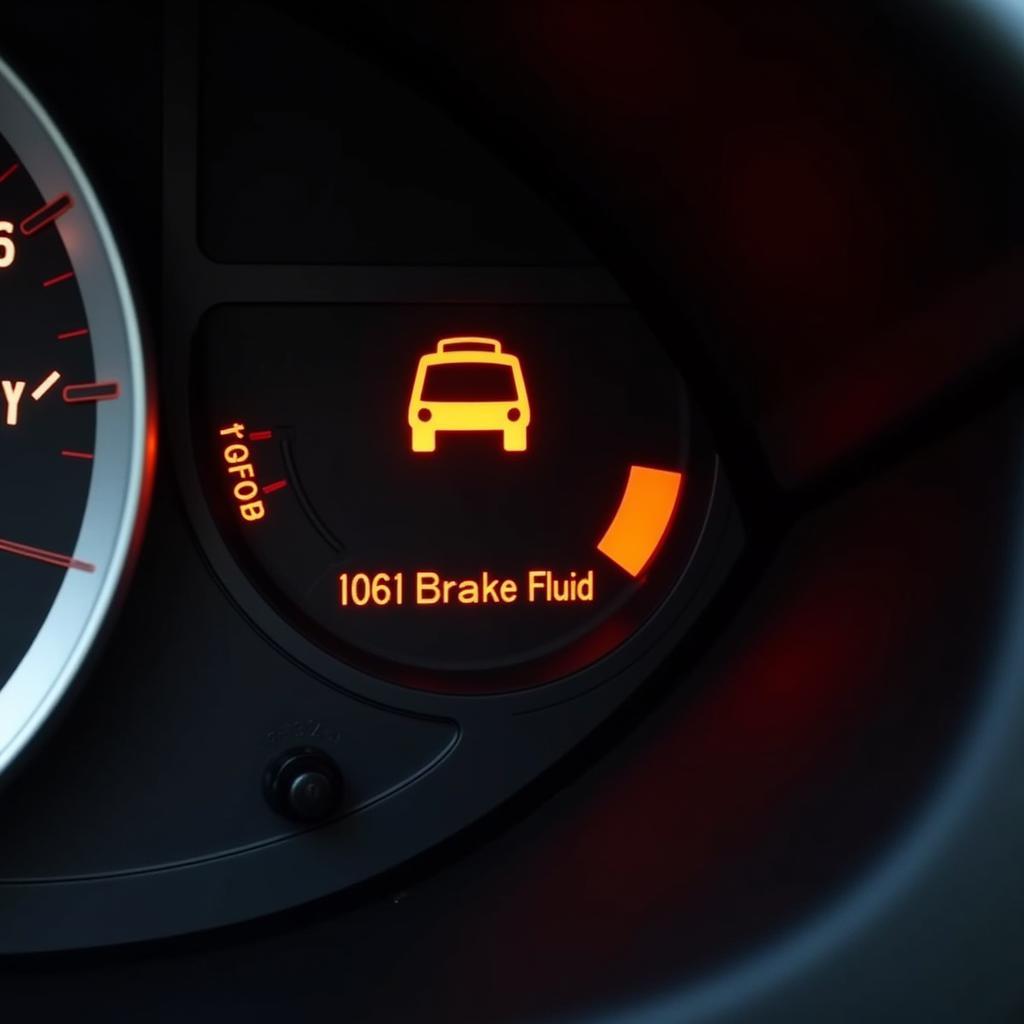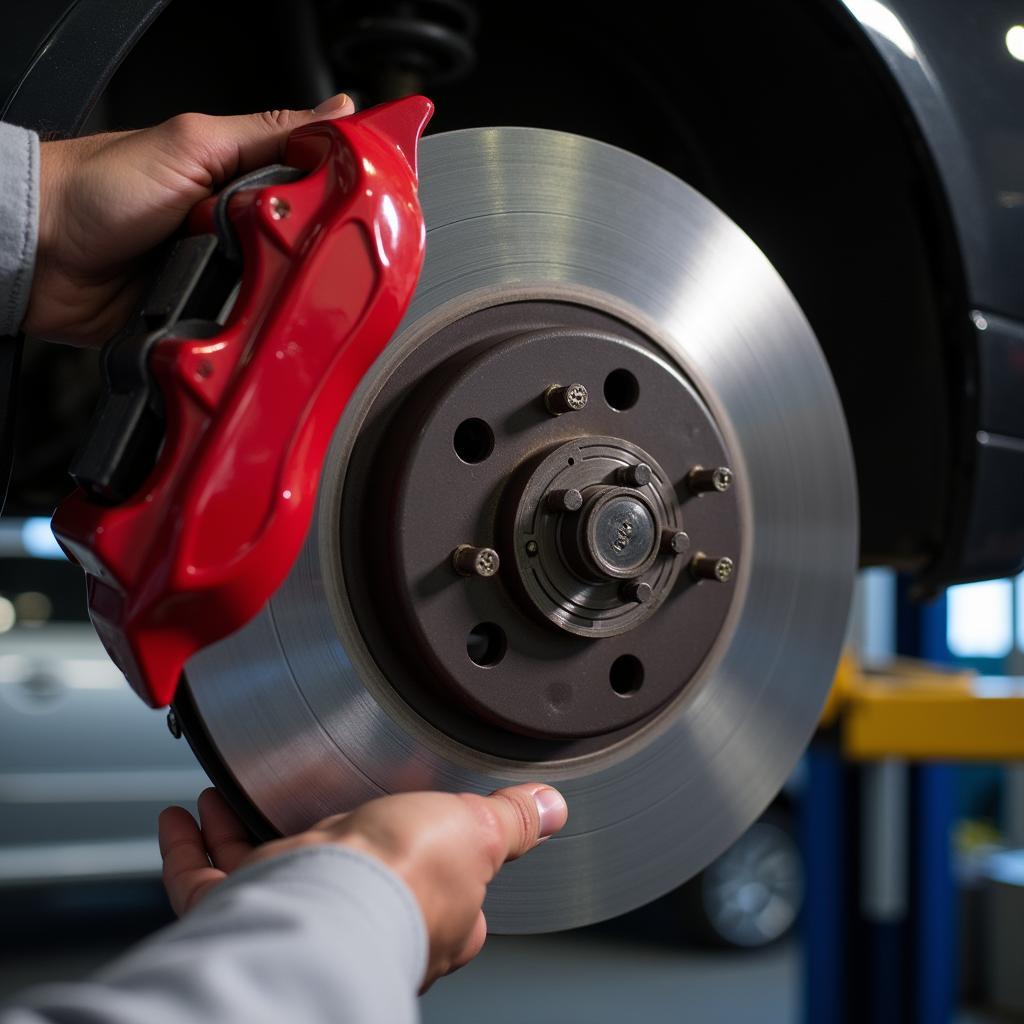Low brake fluid can absolutely trigger your brake warning light. In fact, it’s one of the most common reasons for this light to illuminate. Understanding why this happens is crucial for maintaining your vehicle’s safety and preventing costly repairs. This article will delve into the relationship between low brake fluid and the brake warning light, exploring the causes, consequences, and solutions.
If you’re seeing that warning light, don’t ignore it. It’s your car’s way of telling you something isn’t right. Checking your brake fluid level is a simple first step in diagnosing the problem. Even a small leak can lead to low fluid levels and activate the warning light. Beyond the light, you might experience a soft or spongy brake pedal, reduced braking performance, or even complete brake failure in extreme cases.
Why Does Low Brake Fluid Trigger the Warning Light?
Your car’s brake system relies on hydraulic pressure to function properly. When you press the brake pedal, this pressure is transmitted through the brake fluid to the brake calipers, engaging the brake pads and stopping the vehicle. When the fluid level drops, the pressure in the system decreases. This drop in pressure triggers a sensor, which then illuminates the brake warning light on your dashboard. This mechanism is designed to alert you to a potential problem before it becomes a serious safety hazard.
It’s important to remember that while low brake fluid is a common culprit, the brake warning light can also indicate other issues within the brake system, such as worn brake pads, a malfunctioning ABS system, or a faulty brake light switch. Therefore, it’s essential to investigate the root cause whenever the light comes on.
 Low Brake Fluid Warning Light on Car Dashboard
Low Brake Fluid Warning Light on Car Dashboard
Identifying the Causes of Low Brake Fluid
Now that we know can low brake fluid turn brake warning light on, let’s explore why your brake fluid might be low. The most common cause is a leak somewhere in the brake system. This could be a leak in the brake lines, hoses, calipers, or even the master cylinder. Leaks can occur due to wear and tear, corrosion, or damage from road debris.
Another possible cause is worn brake pads. As brake pads wear down, the brake calipers need to extend further to engage the rotors. This requires more brake fluid, which can lead to a lower level in the reservoir. However, this drop should be gradual and not dramatic. A sudden drop in fluid level almost always points to a leak. If you’re experiencing a mercedes brake service warning, it’s crucial to have it checked by a professional.
What to Do When Your Brake Warning Light Comes On
If your brake warning light comes on, the first thing you should do is safely pull over and check your brake fluid level. If it’s low, do not drive the car. Continuing to drive with low brake fluid can lead to dangerous situations, including brake failure. Instead, call a tow truck and have your vehicle taken to a qualified mechanic for inspection and repair.
If you’re comfortable checking your brake fluid, locate the reservoir, typically a translucent plastic container under the hood. Check the fluid level against the minimum and maximum markings on the reservoir. If the level is below the minimum, add the correct type of brake fluid, but remember, adding fluid is only a temporary fix if there’s a leak.
How Can Remote Diagnostics Help?
In today’s technologically advanced world, remote diagnostics and software installations can play a significant role in addressing brake system issues. Services like remote programming can update your car’s software and potentially resolve certain brake system glitches. While a physical inspection is always recommended for brake issues, remote diagnostics can offer a preliminary assessment and sometimes even resolve software-related problems. If you’re experiencing a brake system warning light bmw, remote diagnostics might be a viable starting point.
Preventing Brake Problems
Regular maintenance is key to preventing brake problems. Have your brakes inspected at least once a year or as recommended by your vehicle’s manufacturer. This includes checking the brake pads, rotors, calipers, hoses, and fluid levels. Regularly flushing and replacing your brake fluid can also help maintain optimal brake system performance and prevent corrosion. You can find valuable information on resetting warning lights, such as reset 2002 vw beetle brake warning light, online.
“Regular brake inspections are not just about safety, they’re about peace of mind,” says John Smith, a veteran automotive technician with over 20 years of experience. “A small investment in preventative maintenance can save you from costly repairs down the road.”
 Brake System Inspection by Mechanic
Brake System Inspection by Mechanic
Conclusion
Can low brake fluid turn the brake warning light on? Yes, absolutely. Low brake fluid is a serious issue that should never be ignored. It indicates a potential problem within your brake system and could lead to a dangerous situation if left unchecked. Regular maintenance and prompt attention to warning signs are crucial for ensuring your safety on the road. If you’re facing issues like a bmw brake pad warning light symbol, don’t hesitate to consult a professional. Knowing the potential causes and taking appropriate action can help you prevent costly repairs and keep your brakes functioning optimally. Remember, your safety is paramount.
FAQ
-
What does the brake warning light look like? It typically looks like a circle with parentheses on either side, sometimes with an exclamation point in the center. It may also be accompanied by the word “BRAKE.”
-
Is it safe to drive with the brake warning light on? No, it is not safe. Pull over immediately and check your brake fluid. If it’s low, have your car towed to a mechanic.
-
How often should I check my brake fluid? Check your brake fluid level at least once a month as part of your routine vehicle maintenance.
-
What type of brake fluid should I use? Consult your vehicle’s owner’s manual for the correct type of brake fluid. Using the wrong type can damage your brake system.
-
Can I top off my brake fluid myself? Yes, you can, but if you need to add fluid frequently, you likely have a leak that needs professional attention. If you have a VW bus, understanding the vw bus brake warning light wiring can be helpful in diagnosing the issue.
-
What else can cause the brake warning light to come on besides low fluid? Worn brake pads, a faulty brake light switch, or a malfunctioning ABS system can also trigger the light.
-
How much does it cost to fix low brake fluid? The cost depends on the underlying cause. A simple leak repair might be relatively inexpensive, while a more significant issue like a master cylinder replacement could be more costly.
